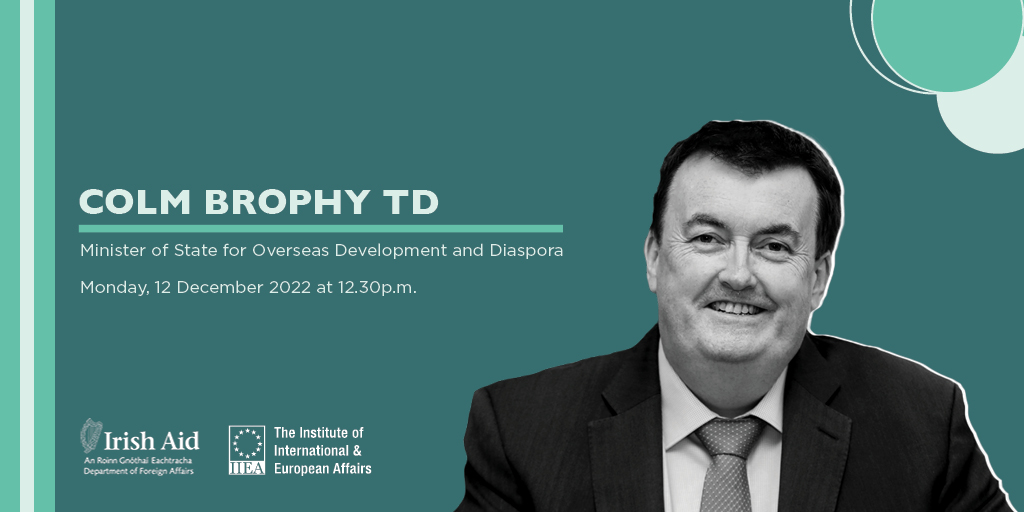The Shadow of Famine: How the food crisis is impacting the Horn of Africa

In the sixth lecture of the 2022 Development Matter series, supported by Irish Aid ,which took place on 12 December 2022, the IIEA hosted Minister of State for Overseas Development and Diaspora, Colm Brophy TD. Informed by a recent visit to the region, Minister Brophy discussed the grave food crisis affecting the Horn of Africa, its causes and the response by Ireland and the international community. The event was chaired by Nora Owen, former Chair of the Joint Oireachtas Committee on Cooperation with Developing Countries.
In opening remarks, H.E. Mr Michael Gaffey, Director General of Irish Aid, reflected on the interlocking crises in the development landscape. Director General Gaffey accompanied Minister Brophy on his visit to the Horn of Africa, and he underscored Ireland’s role in drawing attention to this crisis in 2022, while also increasing funding to the region. Ireland’s Overseas Development Assistance (ODA) fund was given a budget of more than €1.2 billion for 2023, the highest in the history of the State.
Crisis in the Horn of Africa
Minister Brophy described the unfolding catastrophe in the Horn of Africa, and he emphasised that the food crisis deserves all our attention, with more urgency and determination needed in the response by international community. He recalled his reason for visiting the region was to increase domestic and international attention to the dire and rapidly deteriorating humanitarian crisis. In Ethiopia, Somalia, and Kenya, 36 million people have been affected by five seasons of drought, with 21 million people facing acute levels of malnutrition. This impending humanitarian catastrophe, like nothing seen in recent decades, Minister Brophy said, is caused by the interlocking crises of drought, climate change, regional conflict and unsustainable food systems and is eradicating a way of life in the Horn of Africa.
Minister Brophy outlined the disproportionate impact the crisis is having on women and children. An estimated 45 million children under the age of 5 suffered from wasting in 2021, a statistic he said, which was hard to comprehend. Child wasting is one of the World Health Assembly nutrition target indicators used to assess the prevalence of childhood malnutrition and a child is defined as ‘wasted’ if their weight is too low for their height. In this situation, he said there is opportunity to prevent greater humanitarian catastrophe. Humanitarian agencies and partners have appealed for $3.4 billion, an appeal which at the time of his address had only received 55% of this funding. Minister Brophy added that this lack of funding is severely limiting the work of these organisations and the responsibility lies with developed countries, who cannot ignore the role they have played in exacerbating climate change.
Support from Ireland and the International Community
Minister Brophy described the support which the Irish Government has given to the Horn of Africa in 2022, which amounted to over €100 million. Ireland’s funding, he outlined, supports the most vulnerable communities through trusted partners on the ground, with a focus on lifesaving health, nutrition, water and sanitation, and cash response in line with Ireland’s commitment to reach the furthest behind first and leave no one behind, and pays special attention to the plight of women and girls. The immediate priority of this support is to save lives, but it will also lay the groundwork for long term resilience and development, in what Minister Brophy described as Ireland’s allyship of immediate response and development work, in order to support and empower communities. Minister Brophy commended the work of Irish NGO’s working in the region and commented on the generosity and ongoing support of the Irish public for international humanitarian crises and the organisations that respond to them.
Minister Brophy described how Ireland has taken a strong leadership position on the region during its tenure on the UN Security Council by prioritising the key drivers of the food crisis at Council level. Coordination across the nexus of humanitarian-development-peace actions is now more important than ever, he asserted.
Conclusion
Concluding, Minister Brophy stated that the current crisis in the Horn of Africa is too big for one country to tackle alone and requires an approach from the international community as a whole. While Minister Brophy’s recollections of his visit and his analysis of the current situation gave insights into the dire situation in the region, it also highlighted some positive advancements such as the successful democratic elections in both Somalia and Kenya, and the peace accord which was signed by the Ethiopian Government and Tigrayan forces. Minister Brophy ended his impassioned address by reminding the audience that there is still a chance to avoid the worst-case scenario, but if we wait until the cameras turn up, we have all failed the people in the Horn of Africa.
